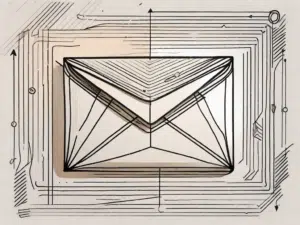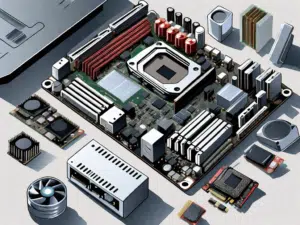In the world of technology, the term “register” has a lot of meaning. It refers to a small amount of fast memory built into the computer's processor. Registers are used to store and control data and are an important component in the execution of instructions by the central processing unit (CPU). They allow faster access to data and commands, significantly improving the performance of the computer system.
Test your technical knowledge
How well do you know your technical terms?
Understanding the meaning of technical terms is essential for anyone venturing into the exciting world of technology. Among the numerous terms you will encounter, “Register” is one that has a special meaning. Let's take a closer look at this term to better understand its meaning and importance in the world of technology.
In the field of computer architecture, a register is a small memory space built directly into the central processing unit (CPU). It is used to store data that the CPU can access quickly, making it an essential part of any computer system. Registers are typically made of flip-flops, which are electronic circuits that can store a single bit of information.
Registers play a crucial role in executing instructions within a computer system. They are used to store operands, that is, data on which operations are performed. If you e.g. For example, if you add two numbers together, the CPU retrieves those numbers from memory and stores them in registers for processing. Registers also store the results of calculations so that the CPU can perform subsequent operations on the updated data.
There are different types of registers, each serving a specific purpose. The most common include the program counter (PC), which stores the memory address of the next instruction to be executed, the instruction register (IR), which contains the currently executed instruction, and the accumulator, which is used for arithmetic and logical operations.
Registers are designed to be fast and efficient, allowing the CPU to access data quickly. They are typically organized in a hierarchy, with the fastest and smallest registers located in close proximity to the CPU, while the larger registers are further away. This hierarchy ensures that frequently accessed data is stored in the fastest registers, reducing the time it takes for the CPU to retrieve and process information.
As technology has advanced, the size and number of registers in CPUs have increased, allowing for faster and more efficient processing. Modern CPUs often have multiple levels of cache memories, which are essentially larger and slower registers that store frequently accessed data. This cache hierarchy further increases the performance of the CPU because there is less need to access the slower main memory.
In summary, registers are an integral part of computer architecture and play an important role in executing instructions and processing data. They provide fast and efficient storage for data that is frequently accessed by the CPU, allowing the computer system to perform tasks quickly and effectively. Understanding the concept of registers is essential for anyone who wants to delve deeper into the world of technology and computer science.
Unleash the power of technology
Explore the latest technical innovations
As technology advances at an unprecedented pace, it is critical to keep up with the latest advances. These innovations often come with a plethora of new terminology, including terms like “registers,” which can be confusing to the uninitiated. By delving into the realm of registers, we can develop a deeper understanding of the technology and harness its power.
In the context of computer architecture, registers are small and fast storage locations within a processor. They play a fundamental role in the execution of instructions and the overall performance of a computer system. Understanding how registers work is like peering into the inner workings of a complex machine, revealing the intricate mechanisms that drive modern technology.
Registers serve as temporary storage for data that the processor needs to access quickly. They contain information such as memory addresses, data values and control signals. Through the effective use of registers you can processors perform complex calculations, execute commands, and manage data efficiently.
One of the main advantages of registers is their speed. Because they are located within the processor itself, registers have extremely fast access times compared to other types of memory. This allows processors to retrieve and manipulate data quickly, resulting in improved performance and responsiveness.
In addition, registers also play a crucial role in optimizing memory access. By storing frequently accessed data in registers, processors can facilitate retrieval of data from slower memory sources, such as memory sources. B. dem RAM, to reduce. This caching mechanism helps to minimize latency and improve the overall efficiency of the system.
There are different types of registers, each serving a specific purpose. For example, general purpose registers are used to store data that can be manipulated by various instructions. On the other hand, special registers serve certain functions, such as: B. storing the program counter or the status of the processor.
Understanding the intricacies of registries can help you make informed decisions when it comes to technology. Whether it's optimizing code for better performance, designing efficient algorithms, or troubleshooting system problems, a deeper understanding of registers can prove invaluable.
In summary, delving into the realm of registers allows us to gain a deeper understanding of the technology and harness its power. Understanding how registers work and the role they play in computer architecture gives us insight into the inner workings of modern technology. So let's embark on a journey of exploration and discovery where we can unlock the secrets of the registers and unlock the full potential of the technology.
Decoding the language of computers
A comprehensive guide to technical terminology
When delving into the complicated world of computers, it is important to decipher the language they speak. Registers play a central role in this language because they act as a bridge between the software and hardware components of a computer system. To fully understand the vast landscape of technical terminology, we should delve into registers and their meaning.
Stay up to date on technology
Important technical terms you should know
If you want to stay ahead of the curve in the ever-evolving world of technology, you should definitely familiarize yourself with the most important technical terms. Registers are the focus because they are a fundamental concept that helps computers function. Familiarizing yourself with registers and their role in technology will provide you with a valuable tool for navigating the fast-paced world of technology.
The Ultimate Technical Dictionary
Demystifying complex technical terminology
When dealing with complex technical terminology, it is important to have a reliable source at hand. A comprehensive technical dictionary serves as a guide and brings clarity to complicated concepts such as: B. Register. By demystifying these complex terms, it enables individuals to improve their understanding and communicate effectively in the ever-evolving technology landscape.
Embrace the technological revolution
Understanding the impact of technology on our lives
As technology continues to revolutionize the world around us, it is imperative to understand its profound impact on our lives. Registries, with their central role in the functioning of computer systems, are a cornerstone of this revolution. When we understand the importance of registers, we can fully harness the transformative power of technology and use it to improve our daily lives.
Master the technical world
Basic technical concepts for beginners
Embarking on the journey to master the world of technology can be an overwhelming undertaking for beginners. By grasping the basic technical concepts such as: B. Registers, however, provide beginners with a solid foundation for their technical endeavors. By understanding the importance and value of registries, they will have the skills necessary to navigate the complex world of technology and embark on a path of continuous learning and growth.
In summary, registries have enormous meaning and importance in the world of technology. Whether they power the latest technological innovations or are an essential part of the computer language, registers play a central role in the smooth functioning of computer systems. By understanding their purpose and importance, one can expand one's technical knowledge, stay ahead of the curve in technology, and take advantage of the revolutionary changes that technology brings. So let's delve deeper into the realm of registers and expand our horizons in the wondrous world of technology.





